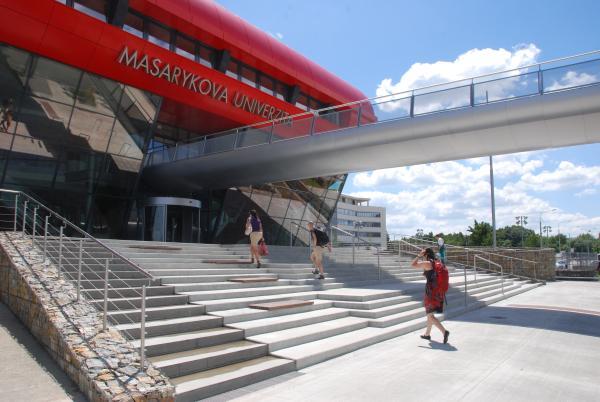
Masaryk main entrance
Masaryk University, new campus in Brno-Bohunice, the first large-scale education project co-financed by the EIB (EUR 95 million) is now fully completed after seven years of construction. It is the biggest investment in higher education in Central and Eastern Europe.
"The fact that we are here today in front of the campus is a small miracle," says University Rector, Petr Fiala. "A construction plan originated back in 1919 when Masaryk University was established. It was supposed to take 10 years, but our predecessors only managed to build the Law Faculty in the years between the two World Wars. The rest remained a dream."
The successful implementation of the campus project also means that there exists now an infrastructure that meets stringent international standards in terms of education, research and development while facilitating the development of an entire city and region. Masaryk university is the number two employer in the South Moravia Region with 4779 employees, of which 2314 are academic staff. The newly built campus situated in Brno University Hospital at the heart of Bohunice is an important part of the University. It covers more than 42 hectares and will house the science, medical and sports studies faculties.
About 5,000 students and 1,000 scientific researchers will use its 24 pavilions, library, classrooms, auditorium and sports hall. A covered footbridge connects the grounds with Bohunice Hospital, where medical students can attend lectures and where research is carried out. To facilitate transport and accommodation, the municipality of Brno intends to build dormitories by the end of 2011 and is planning the construction in the next three years of a tramway line to the periphery of Bohunice.
Special care for disabled students
A special feature of the university is its policy with regard to students with disabilities. Masaryk University is the only Czech university where the proportion of visually and auditory handicapped students equals the percentage of handicapped people of the Czech population. Leading lines, sound navigation and touch navigation support the visually-handicapped students. In addition, a Support Centre for Students with Special Needs ensures that they can attend all the fields of study accredited by the university and enjoy the same standards of education as the rest of the students. In 2010, 350 handicapped students were enrolled in degree programmes, of whom 83 are blind or visually handicapped, 91 deaf or auditory handicapped.
Strong emphasis on scientific research
Masaryk University has also attained a leading position in competitions for research grants and is making considerable financial investments at its new university campus to enhance its research and teaching capacity. It is developing tools for the transfer of knowledge and improved support for research and innovation. The university is, for instance, heavily involved in the mobility activities and research programmes of the European Union and other countries, thanks to which graduates of Bachelor’s or Master’s studies at other institutions may continue at the Master’s or doctoral levels at Masaryk University. Also, between October 2010 and March 2011, six applications were submitted in order to obtain an industrial /legal protection for results of research at Masaryk. The university houses a total of 18 teams participating in long-term research plans running since 2005 as Hellas, five research centers and 17 primary research centers.
Second largest EIB borrower in the new Member States
The Czech Republic is the second largest EIB borrower by volume among the Member States that joined the Union after 2004. Since 1990 the EIB has been financing projects fostering the integration of the Czech Republic into the European Union with commitments of EUR 14.4 billion. The bank’s lending operations cover all economic sectors, ranging from basic infrastructure to manufacturing and services, including support for small and medium-sized companies through local financial institutions, and the development of a knowledge-based economy. In the field of education, from 2002 to 2010, EIB’s lending commitments reached EUR 164 million. Financing in the knowledge economy is one of the EIB’s priorities and has reached EUR 17billion in 2010.


